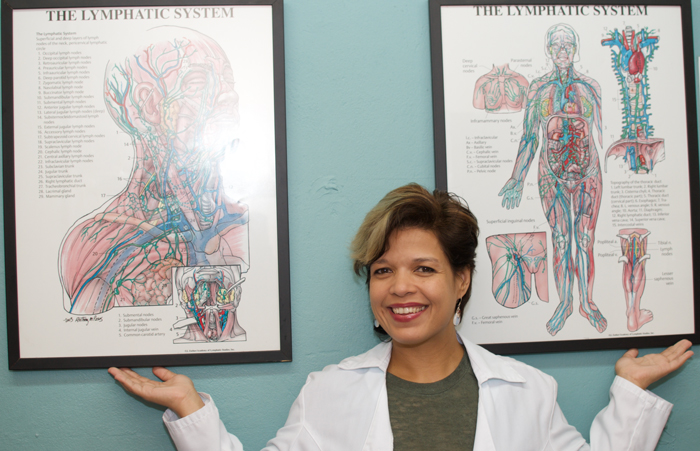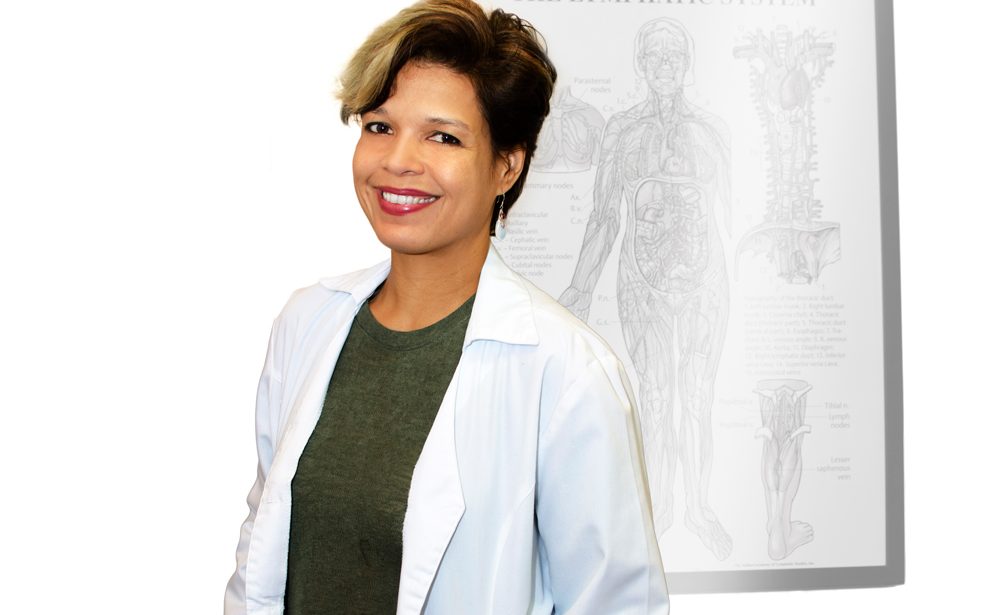Ask anyone about cancer, and familiarity floods in — but ask about lymphedema, and these same faces might furrow in confusion.
Most of us know very little about the lymphatic system, and unfortunately may only learn about it when faced with a life-threatening condition.
Localised swelling to the arm or legLymphedema occurs when the lymph vessels are blocked or unable to carry lymph fluid away from the tissues, causing localised swelling to the arm or leg. It is perhaps one of the least understood medical conditions, although it affects over 100 million people worldwide.
“People often think it is a rare disease, or a type of cancer — but it is far from rare, and while cancer treatment can be a precipitating factor, it can also be present from birth or result from an infection,” explains Karie Ann De Gannes, certified lymphedema therapist.
Karie Ann is the Founder and Director of the Lymphedema Association of Trinidad and Tobago (LATT).
Once someone has lymphedema, it is for lifeLATT’s mission is to provide resources, information, education, awareness and support to those affected with or at risk of primary or secondary lymphedema; their families, health care professionals and the general public.
“Ignorance about the condition can be detrimental,” notes Karie Ann.
“Some people don’t realise what it is and they ignore it, hoping that it will go away. But, once someone has lymphedema, it is for life.”
The Field of Lymphedema Therapy
For Karie Ann, this field of expertise chose her.
A rehabilitative massage therapistThe daughter of renowned former national coach Gerard “Corkie” De Gannes, Karie Ann entered into the field of sport as a rehabilitative massage therapist. While seeing patients, she began to realise the high occurrence of lymphedema.
“Physiotherapists often recommend patients to me after they have undergone breast cancer surgery,” she explains. “At first, when I noticed swelling in the tissue, I thought it was edema; but as I began to do more research I realised that in many cases it was actually lymphedema, a more serious and permanent condition.”

She pursued further studies at Florida College of Natural Health, and at The Academy of Lymphatic Studies in Florida, U.S.A., where she did a course in Complete Decongestive Therapy (CDT).
CDT, the treatment of choice for lymphedema according to the International Society of Lymphology, is a combination of the Dr. Vodder method of manual lymph drainage, which uses repetitive, circular and spiral-shaped movements with an increase and decrease in pressure; Multi-Layer Short Stretch Bandaging, which helps to reduce the pressure; a range of remedial therapeutic exercises; and other approaches to diet and skin care that help the patient to manage the condition.
The condition can become much worse if not properly managed“Training to manage this condition is an added-on skillset to an existing body of medical knowledge,” Karie explains.
“For example, a massage therapist, physiotherapist, occupational therapist, a doctor, a nurse or other such fields are entry points to expand your knowledge and become certified in lymphedema management.”
Most importantly, she notes, anyone who provides treatment for lymphedema must be a certified lymphedema therapist, as the condition can become much worse if not properly managed.
Lymphedema: The Basics
Our bodies have a network of lymph nodes and lymph vessels that collect and carry watery, clear lymph fluid, which contains proteins, salts, water, and white blood cells which help fight infection.
What causes Lymphedema?
Lymphedema is a type of swelling that happens when lymph builds up in your body’s soft tissues due to being damaged or blocked. It usually happens in the arms or legs.
Breast cancer is one of the most common causesPrimary lymphedema is present at birth due to inherited conditions in which lymph nodes or vessels are absent or abnormal.
Secondary lymphedema develops as a result of damage to or dysfunction of the lymphatic system. This can be due to any form of trauma such as:
- Cancer – cancer cells can block lymphatic vessels
- Infection – infection of the lymph nodes or parasites can restrict the flow of lymph fluid
- Scar tissue – caused by radiation therapy or surgical removal of lymph nodes
Breast cancer is one of the most common causes of lymphedema, due to the surgical removal of lymph nodes and/or radiation treatment that can change the flow of lymph fluid in that part of the body.
Lymphedema signs and symptoms:
- Swelling of part or all of the arm, leg, breast, shoulder, chest, fingers or toes
- A feeling of heaviness or tightness; aching, tingling, or other discomfort in the area
- Restricted range of motion; less flexibility in nearby joints
- Recurring infections
- Hardening and thickening of the skin (fibrosis) that may look red
Treatment options
There is no cure for lymphedema; however it can be managed with early diagnosis and care of the affected limb. Treatment approaches include:
- Compression garments
- Exercises
- Wrapping the arm or leg
- Manual lymph drainage
- Pneumatic compression
- Complete decongestive therapy (CDT) – combining therapies with lifestyle changes
Click here to learn more about lymphedema.
Lymphedema Association of T&T
Through the Lymphedema Association of Trinidad and Tobago (LATT), Karie Ann aims to unite the certified therapists and facilitate newly trained therapists, so as to build a broader network and thus provide more coverage across the country and a better quality of service.
The healthcare system itself can be a barrierOne of her goals is to partner with institutions in the U.S., U.K. and Germany to be able to provide the training for therapists locally, as currently it is only available abroad. To do so, she would need a large contingent of candidates — which is a challenge, as the condition is not widely known.
Another challenge is that insurance companies do not currently provide coverage for lymphedema treatment, which may dissuade patients from following through with their recommended course of therapy.
Furthermore, the healthcare system itself can be a barrier.
“Measurements of patients’ limbs should be taken to track progression of the condition; and patients undergoing cancer treatment should be made aware of the potential risks of lymphedema that may occur as a result,” she says.
“Also, there needs to be a better understanding of diuretics, as these are often prescribed to reduce swelling; however these are generally not recommended for lymphedema as they can exacerbate the problem, although they may be used when swelling is severe or there are multiple causes for the swelling such as renal or heart problems.”
Lymphedema does not exist in isolationKarie Ann continues to work diligently on building awareness nationwide, not only among patients but also among healthcare professionals, so to enable proper diagnosis and thus early intervention to tackle the condition head-on.
“In most instances, lymphedema does not exist in isolation, and a team of professionals may be needed — oncologist, dietitian, physiotherapist, psychologist and others, working in conjunction with the lymphedema therapist,” she adds.
“The body is connected — and a proper course of treatment requires a full-force approach from all angles to truly empower the patient to manage the condition, a lifelong commitment to taking charge of your health.”
Further Information
- If you are a certified lymphedema therapist, or would like to become one, please contact Karie Ann directly at the number provided below.
- The field of Certified Lymphedema Therapy is open to Medical Doctors, Nurses, Physical Therapists, Occupational Therapists, Massage Therapists. LATT is looking for members, individuals with primary or secondary lymphedema, their caregivers and healthcare professionals are invited to join and become active in achieving this mission.

